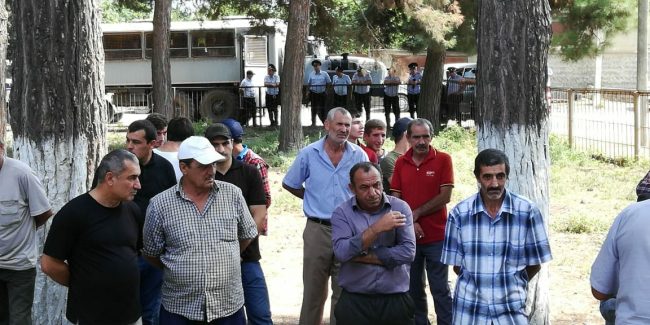
 More than 300 residents of the village of Samur in Daghestan’s southern Magaramkent District gathered on 7 September and demanded an end to drilling for water in the Samur Forest. Military hardware from the National Guard was brought into Samur the same day to protect the construction site of the Samur water pipeline.
More than 300 residents of the village of Samur in Daghestan’s southern Magaramkent District gathered on 7 September and demanded an end to drilling for water in the Samur Forest. Military hardware from the National Guard was brought into Samur the same day to protect the construction site of the Samur water pipeline.
The Samur water intake project was conceived in the 1980s to provide uninterrupted drinking water to the nearby city of Derbent, but was not financed until 2008. By 2013 more than ₽500 million ($7.1 million) had been allocated for the project. In August 2018, drilling of wells resumed in the Samur forest.
In 2011, the Russian government ordered that Samur be turned into a National Park by 2020. There are tens of thousands of species of flora and fauna present in the Samur forest, an area of over 75 square kilometres, including more than 100 listed in Russia’s Red Book of endangered and protected species. The Russian Bird Protection Union declared the mouth of the Samur River a key ornithological site of international importance.
In 2017, the World Wildlife Fund (WWF) placed Samur Forest on a list of five of the oldest forests in Russia under threat. Roman Mnatsekanov, senior coordinator for the WWF in the Russian Caucasus, told OC Media at the time that Samur was the only surviving large area of liana forest in Russia.
Magomed-Ganifa Beybutov, a member of the Magaramkent District Council, told OC Media that the procedures to establish the national park ‘may take about two years, but by this time, there may be nothing remaining of the forest’.
‘No permit’
Residents of Samur told OC Media that construction company Diogen, which has started drilling wells in the forest, does not have the correct permits to do so. According to them, the company was stripped of its license in September 2017 on the recommendations of the Ministry of Environment.
Beybutov told OC Media that Environment Minister Sergey Donskoy wrote to the chairman of the The Presidential Council for Civil Society and Human Rights, Mikhail Fedotov, outlining environmental violations committed by Diogen, after which administrative cases were initiated.
Beybutov also showed OC Media a letter from the ministry in which the former minister suggests abandoning the Samur water project as it could damage the environment and the local economy.
According to Beybutov, Deputy Minister of Construction and Housing and Communal Services Leonid Stavitsky told villagers that they should decide if the work goes ahead or not.
Several residents of Samur told OC Media the village was categorically against construction work in the forest, especially as there were questions over the legality of Diogen’s actions.
According to Beybutov, it was decided at the village meeting to demand the suspension of construction ‘until Diogen obtains the necessary paperwork’.
‘Some groups interfere with the work’
According to Beybutov, Police in Magarakent have prevented them from questioning the head of Diogen, Imirbeg Amakhanov, about the legality of the work, as ‘only prosecutors have the right to do this’.
Beybutov said they had appealed to the prosecutor’s offices of Russia, Daghestan, and Magaramkent to verify the legality of the company’s work, and sent a letter to the Russian Ministry of Nature. ‘We handed Amakhanov the village’s resolution to suspend the work, but he ignored our suggestion’.
Beybutov said that when military hardware entered the village, several women asked them why they had been sent. ‘The National Guard responded that they were sent because “some groups” were interfering with the work’. According to Beybutov, they were gone by the following day.
‘We want the [acting] head of Daghestan, Vladimir Vasilyev, to come and say that he will be the guarantor that the forest will not suffer from these works, and not to send the National Guard’, he added.
‘What can we do?’
In July 2017, at a meeting of the Presidential Council for Interethnic Relations in Moscow, the head of the Federal Lezgi National and Cultural Autonomy, Arif Kerimov, told Russian President Vladimir Putin about the situation in Samur Forest.
Fazil Tagirmirzoyev, the village head of Samur, told OC Media that on 1 July, the new chairman of the Daghestani government, Artyom Zdunov, instructed him to voice a message from Putin to the villagers that a hydrological assessment should be conducted, after which a decision on the construction could be made.
According to Tagirmirzoyev, the assessment was supposed to be supervised by Prime Minister Dmitry Medvedev and former Chairman of the Government of Daghestan Abdusamad Gamidov.
‘If [the assessment determines] there is no influence [on the forest] — the project can continue, if there is influence — close it and forget about it’, Tagirmirzoyev said.
He added that earlier they were told by experts that the drilling should be stopped as the amount of water feeding the Samur Forest would fall below the permissible level. ‘Now in Moscow they declare that groundwater cannot be touched and artesian water can be touched. What can we do in this situation?’
Tagirmirzoyev said he believed it was a political issue, since most of the water from the Samur River is taken by neighbouring Azerbaijan.
According to Moskovsky Komsomolets, 96% of the water intake of the River Samur is in Daghestan, while neighbouring Azerbaijan takes up to 70% of the water. Since 2010, an agreement means water from the river should be shared equally with Azerbaijan, but locals say the agreement is not being implemented, damaging the Samur Forest.




 12 September 2018
12 September 2018


